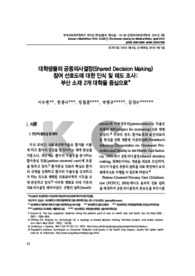

PARTNER
검증된 파트너 제휴사 자료
대학생들의 공동의사결정(Shared Decision Making) 참여 선호도에 대한 인식 및 태도 조사:부산 소재 2개 대학을 중심으로 (Korean College Students’ Attitudes and Preferences Toward Shared Decision-Making between Patients and Physicians)
18 페이지
최초등록일 2025.03.14
최종저작일
2012.04

-
미리보기
서지정보
· 발행기관 : 한국의료윤리학회
· 수록지 정보 : 한국의료윤리학회지 / 15권 / 1호 / 52 ~ 69페이지
· 저자명 : 이수현, 한흥식, 장철훈, 박병규, 김성수
초록
Purpose: The purpose of this study was to examine Korean college students’ attitudes and preferences toward shared decision-making (SDM).
Methods: Questionnaires were collected from 142 college students in Korea. Subjects were asked about four main items: (1) attitudes toward SDM; (2) experiences with SDM; (3) preferences for treatment decision-making for four diseases; (4) barriers to SDM.
Results: It was found that 78% of the participants had never heard of SDM and 61% indicated that the doctor-patient relationship is paternalistic. The majority of subjects believed that the final treatment decision should be made by doctors and patients together. While 39% of subjects said that their doctors had asked them to participate in treatment decision-making, only 10% of subjects felt that their doctors actually wanted them to participate in SDM. The type of disease in question had no effect on the subjects’ preferences for treatment decisionmaking; all subjects expressed a preference for playing a collaborative role in the decisionmaking process. Furthermore, subjects believed that when patients and physicians disagree on treatment options, patient preferences should take precedence. Finally, subjects indicated that the main factors impeding SDM are (a) a lack of information about prognosis (28%), (b)beliefs about doctors’ sole authority for treatment decision (25%), (c) the lack of consultation time with doctors (19%), (d) the difficulties of understanding medical terms, and (e) the scarcity of available opportunities for participation in SDM. Conclusion: Although most subjects in this study were not familiar with SDM, they showed high preferences for it. Additionally, subjects did not feel that their doctors often used shared decision making. Physicians in Korea should make greater efforts to engage in SDM with their patients.영어초록
Purpose: The purpose of this study was to examine Korean college students’ attitudes and preferences toward shared decision-making (SDM).
Methods: Questionnaires were collected from 142 college students in Korea. Subjects were asked about four main items: (1) attitudes toward SDM; (2) experiences with SDM; (3) preferences for treatment decision-making for four diseases; (4) barriers to SDM.
Results: It was found that 78% of the participants had never heard of SDM and 61% indicated that the doctor-patient relationship is paternalistic. The majority of subjects believed that the final treatment decision should be made by doctors and patients together. While 39% of subjects said that their doctors had asked them to participate in treatment decision-making, only 10% of subjects felt that their doctors actually wanted them to participate in SDM. The type of disease in question had no effect on the subjects’ preferences for treatment decisionmaking; all subjects expressed a preference for playing a collaborative role in the decisionmaking process. Furthermore, subjects believed that when patients and physicians disagree on treatment options, patient preferences should take precedence. Finally, subjects indicated that the main factors impeding SDM are (a) a lack of information about prognosis (28%), (b)beliefs about doctors’ sole authority for treatment decision (25%), (c) the lack of consultation time with doctors (19%), (d) the difficulties of understanding medical terms, and (e) the scarcity of available opportunities for participation in SDM. Conclusion: Although most subjects in this study were not familiar with SDM, they showed high preferences for it. Additionally, subjects did not feel that their doctors often used shared decision making. Physicians in Korea should make greater efforts to engage in SDM with their patients.참고자료
· 없음태그
-
자주묻는질문의 답변을 확인해 주세요

꼭 알아주세요
-
자료의 정보 및 내용의 진실성에 대하여 해피캠퍼스는 보증하지 않으며, 해당 정보 및 게시물 저작권과 기타 법적 책임은 자료 등록자에게 있습니다.
자료 및 게시물 내용의 불법적 이용, 무단 전재∙배포는 금지되어 있습니다.
저작권침해, 명예훼손 등 분쟁 요소 발견 시 고객센터의 저작권침해 신고센터를 이용해 주시기 바랍니다. -
해피캠퍼스는 구매자와 판매자 모두가 만족하는 서비스가 되도록 노력하고 있으며, 아래의 4가지 자료환불 조건을 꼭 확인해주시기 바랍니다.
파일오류 중복자료 저작권 없음 설명과 실제 내용 불일치 파일의 다운로드가 제대로 되지 않거나 파일형식에 맞는 프로그램으로 정상 작동하지 않는 경우 다른 자료와 70% 이상 내용이 일치하는 경우 (중복임을 확인할 수 있는 근거 필요함) 인터넷의 다른 사이트, 연구기관, 학교, 서적 등의 자료를 도용한 경우 자료의 설명과 실제 자료의 내용이 일치하지 않는 경우
“한국의료윤리학회지”의 다른 논문도 확인해 보세요!
-
바이오뱅크와 포괄적 동의(Broad Consent) 16 페이지
The biobank, which is recently pursued by many countries, is supposed to play an important role for the development of the Biomedical science. Thus, I argue that there are a number of important ethica.. -
심폐소생술 금지(Do-Not-Resuscitate)를 결정한 암환자 가족의 경험에 관한 현상학적 연구 18 페이지
The purpose of the study was to understand the experiences of family members of who made do-notresuscitate(DNR) decisions for patients with cancer. A phenomenological approach was used to understand a.. -
심장호흡사 기준에 의한 장기구득에 관한 비판적 고찰:피츠버그 프로토콜에 의한 첫 번째 사례 분석 10 페이지
While organ transplantation is accepted medical practice, it is hampered by the shortage of available donor organs. In an attempt to resolve the imbalance between the supply of, and demand for, organs..
문서 초안을 생성해주는 EasyAI
